The Divine Dance: The Trinity and Your Transformation by RIchard Rohr with Mike Morrell (Whitaker House) regularly $23.99 ON SALE here for 20% OFF — $19.19
TO REVIEW OR NOT TO REVIEW…
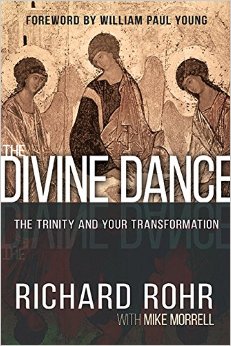 Every now and then a book comes along that I have some degree of ambivalence about reviewing. Often it is because it is a more complex book than I am equipped to adequately discuss; often it is because the book will be loved by many and hated by others and I feel rather caught in the middle, fearful I’ll lose friends or business by liking, or disliking a certain author. Usually it is a book that is going to be a publishing phenomenon, one that people will hear about so the stakes are high, or they feel that way to me. Some days I wonder if it is worth it…
Every now and then a book comes along that I have some degree of ambivalence about reviewing. Often it is because it is a more complex book than I am equipped to adequately discuss; often it is because the book will be loved by many and hated by others and I feel rather caught in the middle, fearful I’ll lose friends or business by liking, or disliking a certain author. Usually it is a book that is going to be a publishing phenomenon, one that people will hear about so the stakes are high, or they feel that way to me. Some days I wonder if it is worth it…
In my characteristic manner I want to make a case for reading widely; generously and critically. I think it is unfortunate if you read only stuff you already like, if you never stretch yourself to engage authors that you may be inclined to disagree with. So it’s what we do, invite people into civil and interesting conversations about big ideas, sometimes based on controversial books. Do you remember my four or five part epic reviews of Rob Bell’s Love Wins? I ended up writing more words about that little book that Rob himself wrote in the book. And then I did a short video feature. At the end I basically advised that one read it for oneself and make up your own mind. Brilliant, eh?
I do not intend to spill so much ink about the brand new book by Wild Goose dude Mike Morrell and Franciscan mystic Richard Rohr called The Divine Dance: The Trinity and Your Transformation but, well, I can’t help myself. I announced it in our last post listing a few other books on spiritual formation and it is now out so I want to chime in with a few affirming notes and a few disappointments.
FREE STUFF. A LOT OF FREE STUFF.
 To encourage readers to buy it from indie bookstores, by the way, Father Rohr and his new old-school Pentecostal publisher – Whitaker House – have created an incentive which I didn’t tell you about last week.
To encourage readers to buy it from indie bookstores, by the way, Father Rohr and his new old-school Pentecostal publisher – Whitaker House – have created an incentive which I didn’t tell you about last week.
If you buy The Divine Dance from us (at our discounted price) you can get absolutely free a digital package of stuff from Rohr and Whitaker worth about $100.00. This nice deal offers some Fr. Rohr lectures, some Biblical reflections, a download of one of the great books of all of church history, On the Incarnation by Athanasius. (A book beloved by C.S. Lewis, by the way) and more. Click here to see the list of all that is being offered — but do come back and order from us. You can see there the drop down box and all you have to do is select “independent bookstore” to show them that you got it indie. We appreciate it.
We will be sending these brand new hardbacks out right away and can get this supplemental package of free content sent to you soon. For those who aren’t familiar with Father Rohr’s teaching, his daily devotional emails, or some of the sturdy backlist books of Whitaker House, this package will be a great value. THIS OFFER EXPIRES OCTOBER 16, 2016.
I have some initial thoughts about The Divine Dance that I can’t quite shake so I want to be among the first bookstores to discuss the great Franciscan’s new volume now that it has officially released. I am aware that some of our friends will be dismayed to know I like him. Others will be surprised to hear my concerns. I trust all our BookNotes readers will realize it makes sense; we truly believe in reading widely, ecumenically, and, with a discerning generosity to learn from others, even those with whom we are very different. In Richard Mouw’s wonderful little book on civility, Uncommon Decency, he notes that curiosity and teachability are good and healthy traits that create trust and civility in our fraying culture.
I ADMIRE AND APPRECIATE FR. RICHARD ROHR’S UNITING SPIRITUALITY AND ACTION
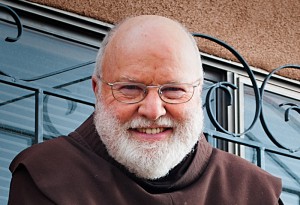 Richard Rohr is a great speaker and energetic teacher and I’ve followed him for years, on and off. He is, understandably, popular literally all over the world. I have a big interest in his project of recent years, relating inner spirituality and outward action. His center in Albuquerque and its Living School for Action and Contemplation invites folks to monastic spirituality, contemplative reflection set in the rawness of the New Mexico desert, all to be transformed in ways that allows participants to be
Richard Rohr is a great speaker and energetic teacher and I’ve followed him for years, on and off. He is, understandably, popular literally all over the world. I have a big interest in his project of recent years, relating inner spirituality and outward action. His center in Albuquerque and its Living School for Action and Contemplation invites folks to monastic spirituality, contemplative reflection set in the rawness of the New Mexico desert, all to be transformed in ways that allows participants to be 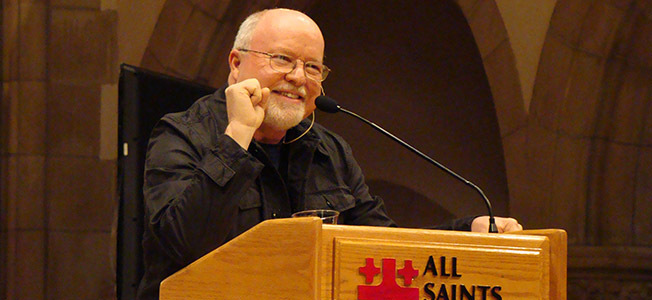 agents of God’s redemptive, healing work in the world. His calling to help build a new world of love and justice is founded upon the need for deeper ways to walk with God. Trust and Obey the old fundamentalists used to sing. Pray and Work chanted the Benedictines. Behold and Be somebody surely said. You get the picture.
agents of God’s redemptive, healing work in the world. His calling to help build a new world of love and justice is founded upon the need for deeper ways to walk with God. Trust and Obey the old fundamentalists used to sing. Pray and Work chanted the Benedictines. Behold and Be somebody surely said. You get the picture.
HE’S NOT ALONE
I really like this kind of stuff. Contemplation in a World of Action is a heavy title by Cistercian monk and literary figure Thomas Merton that captured my attention decades ago. Dear, wounded healer Henri Nouwen worked around the edges of that for most of his life — just think of titles like Peacework on prayer and resistance or the one on downward mobility called The Selfless Way of Christ or his wonderful Making All Things New. I have conducted workshops and 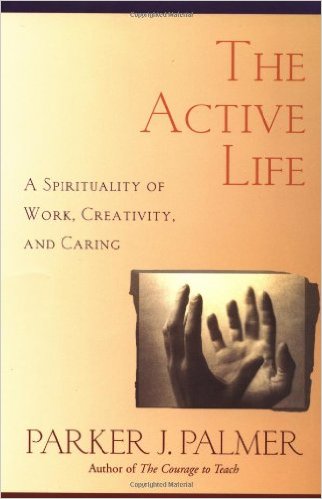 retreats using Parker Palmer’s lovely The Active Life: A Spirituality of Work, Creativity, and Caring. Richard Foster is an impeccable evangelically catholic writer about spiritual formation whose most beloved work, Celebration of Discipline, is arranged around a progression of spiritual practices that move from inward to upward to outward. He links meditation and study, worship and work, prayer and politics — beautiful and so very good. I really, really like a lesser-known book by Tony Campolo and Mary Albert Darling called The God of Intimacy and Action: Reconnecting Ancient Spiritual Practices, Evangelism, and Justice. Do you know it? I trust you know the marvelous social justicy prayer book for
retreats using Parker Palmer’s lovely The Active Life: A Spirituality of Work, Creativity, and Caring. Richard Foster is an impeccable evangelically catholic writer about spiritual formation whose most beloved work, Celebration of Discipline, is arranged around a progression of spiritual practices that move from inward to upward to outward. He links meditation and study, worship and work, prayer and politics — beautiful and so very good. I really, really like a lesser-known book by Tony Campolo and Mary Albert Darling called The God of Intimacy and Action: Reconnecting Ancient Spiritual Practices, Evangelism, and Justice. Do you know it? I trust you know the marvelous social justicy prayer book for 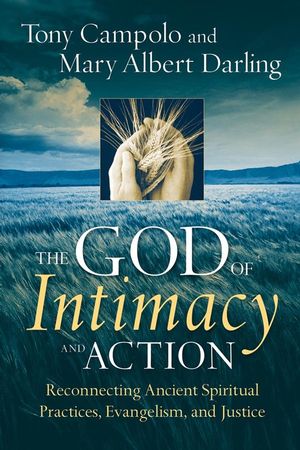 fixed hour prayers created by Shane Claiborne, Jonathan Wilson-Hartgrove and Enuma Okoro called Uncommon Prayer: A Liturgy for Ordinary Radicals. Some of the great Protestant theologians I respect — think of Abraham Kuyper, just for instance — lived in this rhythm of being “near unto God” and yet working for a public life ordered by God’s justice. He wrote treatises on God’s goodness made manifest in the details of creation, works on the Holy Spirit, and on social justice. Near Unto God is a meaty daily devotional based on one line of Psalm 73. And let’s not even start on Karl Barth.
fixed hour prayers created by Shane Claiborne, Jonathan Wilson-Hartgrove and Enuma Okoro called Uncommon Prayer: A Liturgy for Ordinary Radicals. Some of the great Protestant theologians I respect — think of Abraham Kuyper, just for instance — lived in this rhythm of being “near unto God” and yet working for a public life ordered by God’s justice. He wrote treatises on God’s goodness made manifest in the details of creation, works on the Holy Spirit, and on social justice. Near Unto God is a meaty daily devotional based on one line of Psalm 73. And let’s not even start on Karl Barth.
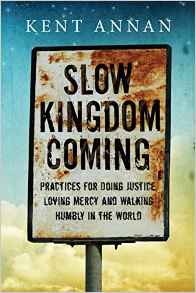 Think, while we’re at it, of the world-changing evangelical piety of William Wilberforce or the prayers of Martin Luther King or the conventional doctrine of Dorothy Day and the simple honesty before God voiced by Saint Mother Theresa. Rohr’s overall project is neither new or unusual, really. Recently not a few activists and relief and development workers have ruminated faithfully on the inner characteristics of sustainable whole life discipleship for the sake of social change; see, for instance, Kent Annan’s very moving and very helpful Slow Kingdom Coming: Practices for Doing Justice, Loving Mercy and Walking Humbly in the World.
Think, while we’re at it, of the world-changing evangelical piety of William Wilberforce or the prayers of Martin Luther King or the conventional doctrine of Dorothy Day and the simple honesty before God voiced by Saint Mother Theresa. Rohr’s overall project is neither new or unusual, really. Recently not a few activists and relief and development workers have ruminated faithfully on the inner characteristics of sustainable whole life discipleship for the sake of social change; see, for instance, Kent Annan’s very moving and very helpful Slow Kingdom Coming: Practices for Doing Justice, Loving Mercy and Walking Humbly in the World.
So I have great appreciation for Rohr’s general charism and ministry project, glad for his witness from his Franciscan seat at the big table of the Body of Christ. I hope he is as aware of the others as many of them are of him.
THE TRINITY
![]() I am also very interested in the specific topic of Mike Morrell and Father Rohr’s new book which explores how best to understand and live into the holy and awesome mystery we call The Trinity. We have a dozen or more books on display here at the store on the Trinity and we’ve applauded publishers such as Eerdmans, IVP, Baker, Crossway, Abingdon, Paulist, Francisan Media, Zondervan, and others for having released thoughtful, important volumes in recent years. I can send to you a list of others that we like if you want. Fr. Rohr is, despite his insinuation, not the first one to say that we need a more robust and generative view of Trinity to fund our deeper spirituality and more loving service in the world.
I am also very interested in the specific topic of Mike Morrell and Father Rohr’s new book which explores how best to understand and live into the holy and awesome mystery we call The Trinity. We have a dozen or more books on display here at the store on the Trinity and we’ve applauded publishers such as Eerdmans, IVP, Baker, Crossway, Abingdon, Paulist, Francisan Media, Zondervan, and others for having released thoughtful, important volumes in recent years. I can send to you a list of others that we like if you want. Fr. Rohr is, despite his insinuation, not the first one to say that we need a more robust and generative view of Trinity to fund our deeper spirituality and more loving service in the world.
He is not the first to insist that knowledge of the Triune Divine One is not, as his Catholic elementary teachers implied “sort of a mathematical conundrum to test our ability to ‘believe impossible things to be true.'” It’s a good line though, and starts us into this long, complicated journey.
BUT…
 I think Rohr is simply wrong about much of what he says in The Divine Dance. I think some of it is beautiful and much is really interesting but other parts needed a more mature and demanding editor. I found some of his tone pastoral and kind – he is an upbeat and pleasant guy and I suspect much of this was first given as talks so it feels chatty and teacherly – and he tells stories of his own epiphanies and Eureka moments as he read books and Scripture but it sometimes had this feel that I found troubling. He is often sloppy, and contradicts himself sometimes on the same page! Perhaps this
I think Rohr is simply wrong about much of what he says in The Divine Dance. I think some of it is beautiful and much is really interesting but other parts needed a more mature and demanding editor. I found some of his tone pastoral and kind – he is an upbeat and pleasant guy and I suspect much of this was first given as talks so it feels chatty and teacherly – and he tells stories of his own epiphanies and Eureka moments as he read books and Scripture but it sometimes had this feel that I found troubling. He is often sloppy, and contradicts himself sometimes on the same page! Perhaps this  comes with the territory of being a movement leader, a guy on the road, on the run, who isn’t firstly an academic. Or maybe it is because it is co-written; the book doesn’t make clear what role Mike played. I suspect the (maybe) young, evangelical editors at Whitaker House were in over their heads, working with 4th century church fathers, quantum physics, modern liberal Catholics and depth psychologists. I appreciate authors who draw on wild and interesting sources and Morrell and Rohr bring in Gerard Manley Hopkins and Ken Wilber; they explain Don Scotus and a bit of Thomistic philosophy’s indebtedness to Aristotle. (I swear I saw some of this on the chalkboard in the classroom of Aquinas scholar Henry McCord, the husband of the Secretary of State on Madame Secretary last night!)
comes with the territory of being a movement leader, a guy on the road, on the run, who isn’t firstly an academic. Or maybe it is because it is co-written; the book doesn’t make clear what role Mike played. I suspect the (maybe) young, evangelical editors at Whitaker House were in over their heads, working with 4th century church fathers, quantum physics, modern liberal Catholics and depth psychologists. I appreciate authors who draw on wild and interesting sources and Morrell and Rohr bring in Gerard Manley Hopkins and Ken Wilber; they explain Don Scotus and a bit of Thomistic philosophy’s indebtedness to Aristotle. (I swear I saw some of this on the chalkboard in the classroom of Aquinas scholar Henry McCord, the husband of the Secretary of State on Madame Secretary last night!)
Of course Rohr cites the medieval women like Hildegard of Bingen (how could he not; it shows his bone fides, like a Shibboleth in some circles these days.) I sympathize with any editor trying to bring together this sprawling, jam-packed collection of chapters that are sometimes only a few pages long. Dipping into Meister Eckhart and describing the differences between kataphatic and apophatic ways of mysticism and relating it to questions of gender and science and inter-religious relations is heavy stuff. Kudos to the publisher for bringing this to us and kudos to this dynamic duo of authors for allowing us to drink from this fire hose. But, still, it needed some fine-tuning and clarifying, I’d say… I hope you are willing to write in the margins of this one! And cross out a few exasperatingly clumsy sentences. But I’m telling you, this is an invigorating book in many, many ways.
SCRIPTURE
There are tons of Bible verses footnoted, and some discussed well in the book, but, to be honest, I found their use of Scripture pretty unsophisticated at times. Yes, the Bible says all things are “in Christ” but to extrapolate to a pantheist worldview – God is in all things – from Acts 17:28, Colossians 3:11, or Galatians 3:28 – is the sort of stuff that wouldn’t pass an intro hermeneutics class.
DANCE, FLOW, ENERGY
A very large contention of the book is one that I found confusing; I will study it more carefully and we invite you, too, as well. Rohr has marvelous and often helpful meditations on the  nature of God the Father, God the Son, God the Holy Spirit, but he also suggests regularly that God is not (only?) a “person” but is the glorious flow of love between and among the Trinity. Trinity – mystery that it/they is/are – is described in Rohr’s lingo not as much as a Dancer (which I like) but as the Dance itself. Not the Person but the process. Unhelpfully, for me, at least, is his insistence on calling this Flow. Yeah, I know.
nature of God the Father, God the Son, God the Holy Spirit, but he also suggests regularly that God is not (only?) a “person” but is the glorious flow of love between and among the Trinity. Trinity – mystery that it/they is/are – is described in Rohr’s lingo not as much as a Dancer (which I like) but as the Dance itself. Not the Person but the process. Unhelpfully, for me, at least, is his insistence on calling this Flow. Yeah, I know.
I really don’t like this approach, reducing God to energy; liberal Protestant’s unknowable “Ground of Being” stuff has proven a near-fatal flaw for my own mainline denominational tradition; that Rohr tries to re-enchant this obscure and lifeless metaphor with passionate talk of love and mystery and “joy supreme” just doesn’t work, in my view. (Oddly, when Rob Bell did that DVD called Life Is Spiritual on quantum physics or when Diana Butler Bass called us to be “grounded” in faith, I nearly swooned. Yet I sense that Rohr is simply off the rails on this, ungrounded.)
ORTHODOX
 Yet, I talked to a very well-read young theologian last night about this very thing – God as Dance, not only Dancer – and she assured me that, indeed, the church leaders like Basil and Gregory of Nyssa and Gregory of Nazianzus who pioneered reflection on the nature of the Trinity used this very language. Another ecumenical scholar recently wrote to me saying that while Rohr may not be “evangelically orthodox” he is actually very Orthodox.
Yet, I talked to a very well-read young theologian last night about this very thing – God as Dance, not only Dancer – and she assured me that, indeed, the church leaders like Basil and Gregory of Nyssa and Gregory of Nazianzus who pioneered reflection on the nature of the Trinity used this very language. Another ecumenical scholar recently wrote to me saying that while Rohr may not be “evangelically orthodox” he is actually very Orthodox.
Okay then. Ready to buy the book now? I hope so.
MAY WE DISAGREE A BIT WITHOUT ASSUMING WE’RE HOPELESSLY STUCK?
But here is something else I worry about, although it is probably my own pride that arouses this anxiety: I fear that to say this – that I object to the tendency to describe God in less intimate terms and more cosmic ones, that is, that hydraulic metaphor of Flow – I will be accused of being trapped in some Distant Male Warrior Supreme Being That Can’t Be Known view of a Bad God. The book routinely sets up this false dichotomy (in a book that happily rails against dualisms!) between Those Who Get It and Those Who Don’t. He’s nice about it, of course, but I was nonetheless put off by this subtly arrogant tone that creeps in, as it often does by those who are reacting against stuff they see as wrong. Maybe it’s a bit of over-reacting, leading to a lack of seriously grappling with nuance, the old pendulum swinging too far. Are our imaginations so limited that we can’t think it might be both/and? I’m trying to wrap my head around that, recalling phrases like “ancient future” and “conservative radical” and the like. Or Jude’s “contending for the faith once passed down” and ecclesia reformata semper reformanda.
URGENCY
There is this urgency in the book that invites us to see Trinity as the key to renewal of authentic faith, to deep relational trust in a loving abba and oneness with the Christ, which can lead to Godly social transformation. I don’t disagree, really, but as with any book, we must notice that it is his view of Trinity that is the one being touted. It isn’t a criticism as such, but Rohr doesn’t just want a renaissance of awareness of and reflection upon the Trinity, he wants this particular view, the one that he believes invites participation in a way that other more static understandings do not. Fair enough, but that’s my quandary: I’m cheering when he invites us to be more deeply Trinitarian, but then grow annoyed when it seems he wants more than classic Trinitarian spirituality. He wants something, else.
UGH
Just for instance, Father RR says, (in italics, no less) “God as Trinity makes competitive religious thinking largely a waste of time.” Well, that’s just silly, since there are mature and deep theologians who study and embrace Trinity who still think it is not a waste of time to make claims about which religious views are best. In fact, Rohr and Morrell are among them – they wrote a book making the claim that their view of faith is best! Apparently caught up as they are in this mystical dance, it still isn’t a waste of time to make arguments about why some views are better than others. I feel like I’m making a cheap shot here, but I use it as an example of some of the muddled thinking here.
They say “only mystics seem to know that the only possible language by which we can talk about God is metaphorical.” Geesh, this is just so arrogant. And so obviously inaccurate. I know lots of non-mystics who are fully aware that our talk about God must necessarily be metaphorical.
Even Rohr, though, spends a lot of time in non-metaphorical images of God and it annoyed me. He talks like a West coast New Age guy, which is funny, because he says more than once that he doesn’t want to sound like a California New Age guy. (At one point he says he would have sounded like a New Ager if he hadn’t quoted the rather eccentric, dualistic, St. John of the Cross. So, yeah, there’s that.)
In what I gather he doesn’t mean metaphorically he says that “God is actually inter-being.” I don’t even know what that means. Rohr says, “Henceforth, you can know and love God on at least three distinctly wonderful levels, the Transpersonal level (“Father”), the Personal level (“Jesus”), and the Impersonal level (“Holy Spirit”). I do not think this is necessarily troubling and it may be helpful to some; words like “transpersonal” just don’t roll of my tongue often. (And the Spirit called “impersonal”? Hmm.)
Rohr cites Merton’s beloved philosophy professor from Gethsemani monastery, Daniel Walsh, who says (according to some class notes, apparently, which is cool) humans might best be described not as a creation but a continuance. We emanate. Again, who talks like this? Is it helpful? He delightfully cites Ephesians 1:4 there, but I didn’t get the connection. Do you? Maybe if you like Tillich’s “Ground of Being” you’ll like being a continuance of it, too. Me, I’ll take imago Dei and Psalm 8, any day.
THIS BOOK IS ALREADY HUGE – LOOK FOR IT ON THE BEST SELLER LIST
 Despite these esoteric phrases Divine Dance is going to be a huge book this fall and is already a top seller in the main venues. It will be displayed in all the major mainstream bookstore chains. You need to know about it, and I think it would be fabulous to read and study together. Do you have a prayer partner, clergy colleague, spiritual director or trusted friend who might want to take this up?
Despite these esoteric phrases Divine Dance is going to be a huge book this fall and is already a top seller in the main venues. It will be displayed in all the major mainstream bookstore chains. You need to know about it, and I think it would be fabulous to read and study together. Do you have a prayer partner, clergy colleague, spiritual director or trusted friend who might want to take this up?
The blurbs on the back are remarkable – Bono loves it, as does Brian McLaren, Nadia B-W, and the usual good suspects. (Although I could imagine my old acquaintance Fr. Phil Berrigan cussing him out for leading folks into psychological navel gazing instead of serious protest.)
I think there are good reason folks like this invitation to beauty and awe and mystery. I’m glad to sell books that encourage us to think about the nature of God, what it means to know and what a loving/spiritual sort of knowledge looks like. Don’t we all want to join in the dance? There is beautiful stuff here – I’ve underlined very good lines in every chapter, alongside my question marks and double question marks.
UNFORTUNATE CARICATURES: NOT EVERYONE WITH OTHER VIEWS OF GOD ARE QUITE SO BAD
I do think The Divine Dance occasionally traffics in stereotypes and caricatures. Again, this is a temptation for reformers, saying what they believe in contrast to the other. Richard is candid about his own struggle with ego and how his sort of spiritual mysticism and being caught up in the loving dance might dissolve that.
Still, a better editor might have caught some of this; maybe Mike is himself too much in over-reaction to his fundamentalist background. Not everybody who has a more conventional view of the Triune nature of God is rooted in Cartesian rationalism or informed by Aristotelian metaphysics. Not everyone views God as angry and distant and there are very lively agents for social shalom, creation care, justice and reconciliation who are deeply grounded in fairly conventional views of God. Despite Rohr’s insistence that we ought not live in binaries and dualism, he seems to have a fairly constrained imagination: folks are either all mystical embracing his non-knowing eternal now of love or they are mired in Zeus-like views of an angry and distant God on top of a Mathematical Pyramid. (Okay, now I’m caricaturing with a touch of satire. Or am I?) Read it yourself and see if I’m overstating this much.
TDD doesn’t seem to affirm (although I suspect he would) that there are deeply, beautifully, fruitfully, spiritual Christian folk – charismatics, evangelicals, conservative Catholics, sacramental Anglicans and more – who don’t talk about sat, chit, ananda — being, consciousness, or bliss; they embrace and are embraced by Trinity, but they don’t quite have his open/mystical view. But they still have a mature and intimate walk with God, deeply aware of the creative, redeeming, and sustaining work of the Three-In-One. Maybe it is so that, as Rohr says, “The Father is Being itself, the Source of the flow, the Creator – the formless One out of which all form comes.” I don’t know if he’s speaking metaphorically when he says we should know God as “nothingness, unspeakable Mystery.” I do know that that language is deeply rooted in well-respected mystical Christianity. I also know that this is not how many mature and wise Christians describe their relationship with God. To call Jesus “The Unmanifest One” is just weird. And I’m not sure where it gets us, personally or missionally.
DO YOU ENJOY BEING INVITED TO REALLY THINK ANEW?
I enjoyed much in The Divine Dance: The Trinity and Your Transformation including how it made me think and ponder; maybe it will help with this stubborn skeptical guy’s transformation. I am curious about the very way, the ordered way, according to the Cappadocian Fathers (that’s Basil, Greg and Greg) that the Persons of the Trinity relate to one another. Rohr says it is a circle dance, but the huge church schism of the 11th century was about the very steps of this dance: who leads who (Who leads Who?) Phyllis Tickle’s book, co-written by Jon Sweeney, which I mentioned in the previous BookNotes (The Age of the Spirit: How the Ghost of an Ancient Controversy Is Shaping the Church) is a very nice introduction to that discussion and how it might effect emerging spiritualities today. I’m going to be revisiting The Divine Dance and maybe some church history on this through the rest of the year, and hope to consider some of his other mystical works – Everything Belongs and The Naked Now are essential to understand him well.
So I appreciate the learning opportunity, the challenge and invitation this offers.
And I am glad to read TDD because I’m reminded, as Rohr & Morell say,
Imagine this: the deepest intuitions of our poets and mystics and Holy Write are aligning with findings on the leading edges of science and empirical discovery. When inner and outer worlds converge like this, something beautify is afoot – the reversal of a centuries long lovers’ quarrel between science and spirituality, mind and heart.
What physicists and contemplatives alike are confirming tis that the foundational nature of reality is relational, everything is in relation to everything else.
SOMETHING BIG IS AFOOT — THANKS BE TO GOD
And, of course, there have been many religious thinkers who have been saying this very thing for decades. From Madeline L’Engle to Leonard Sweet to Herman Dooyeweerd to Wendell Berry. From the brilliant For the Life of the World DVDs put out by neo-Calvinist Kuyperians in partnership with conservative Catholic Acton Institute to the Russian Eucharistic theologian Alexander Schmemann. I see it in the abstract art and beautiful writing of Mako Fujimura and the Evangelical Environmental Network’s good work against climate change. (We’ve been happily promoting Caring for Creation by Mitch Hescox and Paul Douglas, authors with pretty conventional views of God, the Bible, and who tilt conservative on social policy.) Obviously, the work of James K.A. Smith has been moving us this way for decades, now, and his best-selling You Are What You Love: The Spiritual Power of Habit gets at some of these things, without quirky mysticism, in generative, even breathtaking ways. Even a conservative Reformed pastor, Thabiti Anyabwile, who is a leader in the Gospel Coalition, recently did a book on how we should experience and know God not only individually but communally – it’s called The Soul of God in the Life of the Church. The renowned evangelical publishing house Zondervan recently published a book about justice for animals called Vegangelical: How Caring for Animals Can Shape Your Faith. Wow! Rohr is certainly right – something big is afoot! But it isn’t dependent upon taking up all his eccentric ideas about Trinity such as flow and love as energy and it isn’t only found in the progressive wing of the broader church.
THE PARADIGM SHIFT IS URGENT
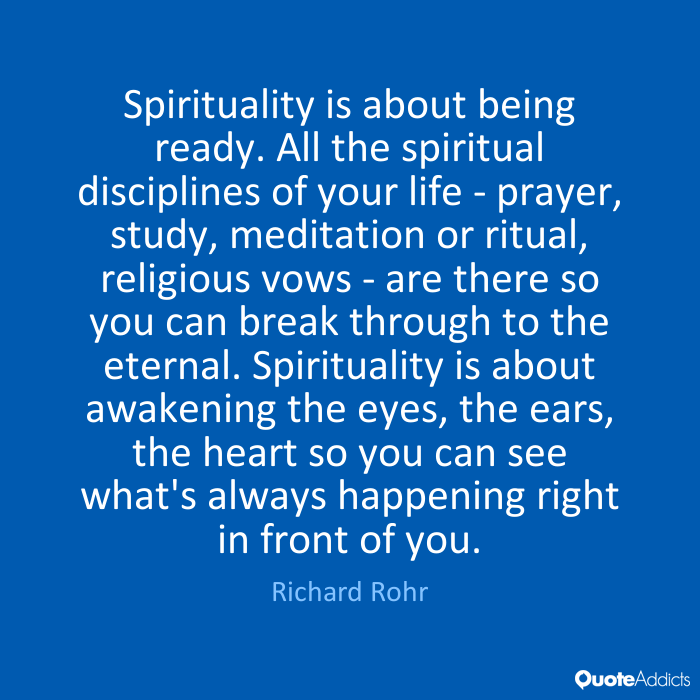 The paradigm shift Richard and Mike call for is urgent. The whole creation groans, church folks are increasingly polarized and distressed and many are just walking away into some sort of “spiritual but not religious” thing. We do need to deepen our commitments to this needed shift — evoked in the passionate forward by William Paul Young, inviting us to life-giving, grace-filled, humble theology which bears fruit in wonder and love and goodness. He is correct in saying that some kinds of bad theology which are propositional and transactional (rather than relational and mysterious) are like pornography – the image of real relationship without the risk of one. And, Rohr reminds us, God’s love is open to all, but God remains “a fussy lover” and holds out for true partners.
The paradigm shift Richard and Mike call for is urgent. The whole creation groans, church folks are increasingly polarized and distressed and many are just walking away into some sort of “spiritual but not religious” thing. We do need to deepen our commitments to this needed shift — evoked in the passionate forward by William Paul Young, inviting us to life-giving, grace-filled, humble theology which bears fruit in wonder and love and goodness. He is correct in saying that some kinds of bad theology which are propositional and transactional (rather than relational and mysterious) are like pornography – the image of real relationship without the risk of one. And, Rohr reminds us, God’s love is open to all, but God remains “a fussy lover” and holds out for true partners.
WHAT IS ESSENTIAL
Such a renewal or reform or revival does depend on us knowing God well, as God really is, and becoming true partners. We must understand gospel grace and the good news of the Kingdom coming, redemption brought through incarnation, death, resurrection, ascension. We must be honest about the Bible’s teachings about the human condition and we 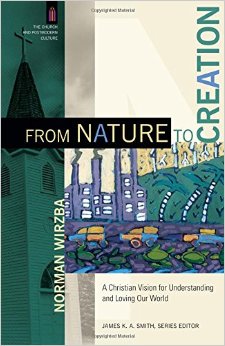 simply must affirm the full humanity and divinity of Christ. We must affirm the lively, living role of the Holy Spirit, empowerer and comforter. And, we must understand, honor, and experience a profound sense of reality as creation, upheld moment by moment by God, in Christ. Why not order from us Norman Wirzba’s From Nature to Creation: A Christian Vision for Understanding and Loving Our World as a fairly heady study of this extraordinary and urgent essential; see, too, the beautiful coffee-table gift book he edited full of nature photography and essays by the likes of Sylvia Keesmaat and Wendell Berry called The Gift of Creation: Images from Scripture and Earth for a more evocative, sensuous way into this deeper understanding of creation. We so enjoy having that here and would love to send a few out. I mention this here, now, because I fear that sometimes guidance about mystical experience and even this sort of dancing participation with God shifts us away from the theater of God that Christ so loves.
simply must affirm the full humanity and divinity of Christ. We must affirm the lively, living role of the Holy Spirit, empowerer and comforter. And, we must understand, honor, and experience a profound sense of reality as creation, upheld moment by moment by God, in Christ. Why not order from us Norman Wirzba’s From Nature to Creation: A Christian Vision for Understanding and Loving Our World as a fairly heady study of this extraordinary and urgent essential; see, too, the beautiful coffee-table gift book he edited full of nature photography and essays by the likes of Sylvia Keesmaat and Wendell Berry called The Gift of Creation: Images from Scripture and Earth for a more evocative, sensuous way into this deeper understanding of creation. We so enjoy having that here and would love to send a few out. I mention this here, now, because I fear that sometimes guidance about mystical experience and even this sort of dancing participation with God shifts us away from the theater of God that Christ so loves.
(Why oh why does Richard say — after quoting the beautiful, beautiful Elizabeth Barrett Browning poem about creation, Aurora Leigh, no less, and offering some of the most beautiful words in the book — that once one enters into some profound and 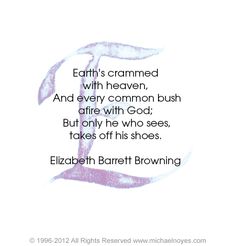 pure awareness of God, that we enter “Consciousness” and “that is all there really is“? Does the beauty of things fade away? Is creation gone? What could this possibly mean? He then cites James 1:17 which affirms good things in life, so he can’t mean what he says. This is a fundamental flaw within most mysticisms that, try as we might with alternative ways of knowing and talk about the body, still is mired in gnosticism and/or Platonic dualism. If knowing the Triune God in the way Richard commends leads us away from or out of creation, then it is simply wrong and will not bear the transforming social fruit that he himself desires. I do not believe he believes that the Flow is “all there really is” but yet there it is on page 77. Maybe the charismatic tendencies of the editors at Whitaker House did not realize what a terribly bad way this is to express Oneness with God. I suppose I misunderstand Mike and Richard here, but it gave me the willies.)
pure awareness of God, that we enter “Consciousness” and “that is all there really is“? Does the beauty of things fade away? Is creation gone? What could this possibly mean? He then cites James 1:17 which affirms good things in life, so he can’t mean what he says. This is a fundamental flaw within most mysticisms that, try as we might with alternative ways of knowing and talk about the body, still is mired in gnosticism and/or Platonic dualism. If knowing the Triune God in the way Richard commends leads us away from or out of creation, then it is simply wrong and will not bear the transforming social fruit that he himself desires. I do not believe he believes that the Flow is “all there really is” but yet there it is on page 77. Maybe the charismatic tendencies of the editors at Whitaker House did not realize what a terribly bad way this is to express Oneness with God. I suppose I misunderstand Mike and Richard here, but it gave me the willies.)
These are all the things this circle dance of a book attempts to clarify. As I’ve shown, I think it gets some of it a little off, a few things pretty seriously wrong. But much of The Divine Dance: The Trinity and Your Transformation is wonderful, and almost all of it is grist for the mill, stuff to ponder, ideas and images and exercises with which to interact. As always, reading widely with discernment is a gift, and I hope many become conversant in this reflection on the space at God’s table and the very triune nature of things. I hope you read it with others. Reading such books together can push us to want to know more, to experience more, to be more.
GROWTH FROM DEEP CONTENTMENT
“The authentic Christian life,” – living inside the flow of Trinity, as Richard puts it – will be a journey of ultimate rest and yet deepening and growth. Such a true life of discipleship,
will always be characterized by two seemingly contradictory things. First you’re going to be constantly yearning and longing for more, the way the Three endlessly desire to give themselves and flow outward. It’s a kind of sacred discontent, a holy dissatisfaction, and a holy desire for more life, love, generativity.
This does not arrive, however, out of a sense of emptiness or scarcity, but precisely because you have touched upon deep contentment and abundance. There’s always still more I can do, more I can include, and experience, there are more people I can serve. There is more that God wants to give me, and more God wants to ask of me. Any of these will show themselves at different times in the life of the mature Christian. Never “I am fully there, I have it all.” A person who is smug is not inside the Trinitarian flow. How can fullness and still yearning for more so beautifully coexist? I have no answer to that, but I know it to be true.
In the life of the Trinity, you can always rest inside a certain kind of deep contentment; it’s all foundationally good and okay….
I like that Rohr brings us, after a good discourse on contentment and emotional snags and judgmental personalities and love of self and love of others, and this healthy sense of holy growth, to I Corinthians 8:1-2. “Knowledge puffs up, whereas love builds up. Some may think they have full knowledge of something yet not know it as they ought to know things.” This epistemology of humility is beautiful and good, a gift many of us need; a spirituality of reverence is what Rohr calls it. As he states, “Knowing without loving is frankly dangerous for the soul and for society.”
AND THIS: KNOWING WELL, COMMON GRACE, AND THE COMMON GOOD?
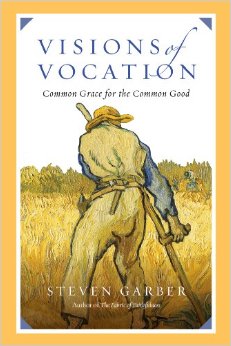 What does it mean to deeply know, with humility, to be known, to care, to serve, to be aware of God’s good creation and its hurts? Can we embrace the cosmic rulership of Christ for all of life without shifting to unhelpful allusions to pantheism and paganism? As is often the case, I think of the beautiful and substantive writing of my friend Steve Garber who in many ways is miles away from Father Rohr. But Garber, like Rohr, was been deeply shaped by what Rowan Williams writes about in his book about Saint John of the Cross, The Wound of Knowledge. I think Garber’s Visions of Vocation: Common Grace for the Common Good is a broad, less mystical book that would be a good one to read alongside this more focused study of Trinity. Can we love the world as God does, Garber asks? And who must we become if we are going to sustain that kind of love? Do our aches transform us into people who can serve God, even in our daily work and callings, in ways the world understands? Garber is no mystic, but He knows God and loves God’s world in all its deep and mysterious complexity.
What does it mean to deeply know, with humility, to be known, to care, to serve, to be aware of God’s good creation and its hurts? Can we embrace the cosmic rulership of Christ for all of life without shifting to unhelpful allusions to pantheism and paganism? As is often the case, I think of the beautiful and substantive writing of my friend Steve Garber who in many ways is miles away from Father Rohr. But Garber, like Rohr, was been deeply shaped by what Rowan Williams writes about in his book about Saint John of the Cross, The Wound of Knowledge. I think Garber’s Visions of Vocation: Common Grace for the Common Good is a broad, less mystical book that would be a good one to read alongside this more focused study of Trinity. Can we love the world as God does, Garber asks? And who must we become if we are going to sustain that kind of love? Do our aches transform us into people who can serve God, even in our daily work and callings, in ways the world understands? Garber is no mystic, but He knows God and loves God’s world in all its deep and mysterious complexity.
So, there’s a lot to think about, a ton of great books, and this is one we wanted to tell you about. Buy it if it intrigues you, ponder it well, and, always, take to hearts Richard’s basic teaching: we can know the Triune God, the One Who Made Us invites us to be in relationship in ways that are saving and transforming, and that allows us to see anew and love well. Somehow in God’s great grace we join this Holy gospel dance and, with others, make the world a somewhat better place. It’s a journey inward and a journey outward and it is joy.

BookNotes
DISCOUNT
ANY ITEM MENTIONED
20% off
order here
takes you to the secure Hearts & Minds order form page
just tell us what you want
inquire here
if you have questions or need more information
just ask us what you want to know
Hearts & Minds 234 East Main Street Dallastown, PA 17313 717-246-3333
